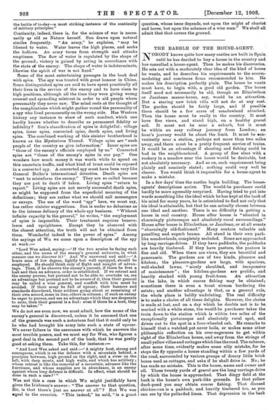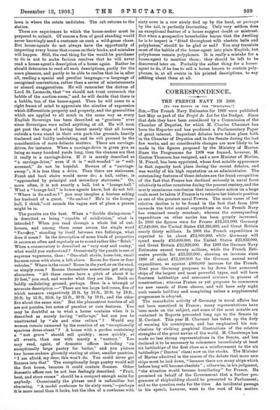THE BABBLE OF THE HOUSE-AGENT.
NOBODY knows quite how many castles are built in Spain until he has decided to buy a house in the country and
has consulted a house-agent. Then be makes his discoveries. He sets out with a moderately clear idea of the kind of house he wants, and he describes his requirements to the accom- modating and courteous firms recommended to him. He makes his description perfectly plain. The house lie wants or Jacobean manor-house, say, would be an attraction. But a staring new brick villa will not do at any cost. The garden should be fairly large, and if possible there should be a few acres of meadowland attached.
Then the house must be really in the country. It must have fine views, and stand high, on a healthy gravel soil. It must not be near a suburb, but it must be within an easy railway journey from London; an hour's journey would be about the limit. It must be con- veniently near a station, perhaps not more than two miles -away, and there must be a pretty frequent service of trains. It would be an advantage if shooting and fishing could be had in the neighbourhood. A group of fine elms with a rookery in a meadow near the house would be desirable, but not absolutely necessary. And so on, each requirement being plainly and concisely stated ; nothing could very well be clearer. You would think it impossible for a house-agent to make a mistake.
In a few days' time the castles begin building. The house- agents' descriptions arrive. The would-be purchaser could hardly be more agreeably surprised. Having tried to put into words something like the ideal which he has kept at the back of his mind for many years, he is astonished to find not only that his ideal is attainable, but that he can actually choose between one ideal and another. There is no difficulty in getting a house in real country. House after house is "situated in charmingly picturesque and absolutely rural surroundings." House after house is Elizabethan, or Jacobean, or at all events "charmingly old-fashioned." Many contain valuable oak panelling and superb beams. All stand in their own park- like meadowlands, completely secluded. Some are approached by long carriage-drives. If they have paddocks, the paddocks are heavily. timbered. If they have pasture, the pasture is fine and old. When there are views, they are beautiful and panoramic. The gardens are of two kinds, pleasure and kitchen; the pleasure-gardens are large, with spacious, well-shaded lawns, " nicely shrabbed, and inexpensive of maintenance " ; the kitchen-gardens are prolific, and
heavily stocked with young fruit-trees. An attraction is the lake, in which coarse fishing may be obtained; sometimes there is even a trout stream bordering the estate;, and another advantage is that, as a general rule, the whole place is boldly undulating. The real difficulty is to make a choice of all these delights. However, the choice is made at last, and on a day which he doubts not is to be, marked with a white stone, the would-be purchaser takes the, ,train down to the station which is within two miles of the exceptionally picturesque and absolutely rural spot, and drives out to the spot in a four-wheeled cab. He remarks to himself that a watched pot never boils, or makes some other, philosophic reflection on his over-eagerness to get within sight of the Elizabethan house, end away from the strings of small yellow villas and cottages which line the road. The cabman,. after some time, evidently makes some silly mistake, for he stops the fly opposite a house standing within a few yards of the road, surrounded by various groups of dreary little brick boxes used as cottages, and asks if he shall drive in. No; he has made no mistake. This is the house, name and owner and all. Those twenty yards of gravel are the long carriage-drive by which' the house is approached. That dingy field at the back is the house's own park-like grounds. In that yellow duck-pond you may obtain coarse fishing. That disused chicken-run is a paddock, and heavily timbered too, as you can see by the pollarded limes. That depression in the back
lawn is where the estate undulates. The cab returns to the station.
These are experiences to which the house-seeker must be prepared to submit. Of course a firm of good standing would never knowingly send a customer on such a wild-goose chase.
But house-agents do not always have the opportunity of inspecting every house that comes on their books, and mistakes will happen. Still, the real thing for the would-be purchaser to do is not to make furious resolves that be will never read a house-agent's description of a house again. Rather he should determine to read all such descriptions, partly for the mere pleasure, and partly to be able to realise that he is, after all, reading a special and peculiar language,—a language of recognised conventions, rather than a series of misstatements or absurd exaggerations. He will remember the dictum of Lord St. Leonards, that "we should not trust overmuch the babble of the auction-room," and he will decide that there is a babble, too, of the house-agent. Then he will come to a right frame of mind to appreciate the niceties of expression which differentiate property and property, and the generalities which are applied to all much in the same way as every English Sovereign has been described as "gracious" ever since Sovereigns were called anything at all. He will soon get past the stage of having learnt merely that all houses outside a town stand in their own park-like grounds, heavily timbered and boldly undulating, and he will proceed to the consideration of more delicate matters. There are carriage- drives, for instance. When a carriage-drive is given you as being so many hundred yards long, then the chances are that
it really is a carriage-drive. If it is merely described as " a carriage-drive," even if it is " well-wooded" or " well- screened," do not be hopeful. Beware of a " carriage- sweep "; it is less than a drive. Then there are staircases. Front and back stairs would never do; a ball, rather, is "approached by principal and secondary staircases." Or, more often, it is not exactly a ball, but a "lounge-hall." What a "lounge-ball" is house-agents know, but do not tell. " Where is So-and-so " you may imagine a hostess asking her husband of a guest. "So-and-so ? 'He's in the lounge- hall, I think,"—it sounds the vague sort of place a person might be in.
The puzzles are the best. When a "double dining-room" is described as being "capable of subdivision," what is intended ? When you read through a whole list of out- houses, and among them come across the single word "Farnlery," standing by itself between two fullstops, what does it mean ? In the description of some kinds of properties it occurs so often and regularly as to sound rather like " Selah." When a conservatory is described as "very cosy and roomy," what would you understand ? Occasionally the puzzle is one of supreme vagueness, thus : " One-stall stable, loose-box, small harness-room with stove, a loft above. Room for three or four vehicles." Where is the room? Room in the yard, or on the road, or simply room ? Rooms themselves sometimes get strange characters. "All these rooms have a pitch of about 9 to 10 feet," you read, and wonder what they are like. Built on boldly undulating ground, perhaps. Here is a triumph of accurate description :—" There are ten large bedrooms, five of which measure respectively 21 ft. by 18 ft., 20 ft. by 18 ft., 20 ft. by 15 ft., 20 ft. by 15 ft., 30 ft. by 19 ft., and the other five about the same size." But the pleasantest touches of all are not puzzles, but notes of peculiar or rare features. You may be doubtful as to what a house contains when it is described as merely having "cellarage," but can you be nnattracted by " ale and wine cellars " ? Would any woman remain unmoved by the mention of an "exceptionally spacious dress-closet "? A house with a garden containing a " nut grove " should sell quickly ; more quickly, at all events, than one with merely a "fluttery." You may read, again, of domestic offices including " an exceptionally large pantry for butler," and you picture two house-seekers gloomily staring at other, smaller pantries. "I am afraid, my dear, this won't do. You could never get Soames into that." The exceptionally large pantry would sell the first house, because it could contain Soames. Other domestic offices can be not less feelingly described. "Fruit, boot, and store rooms " should be a compact enough suite for anybody. Occasionally the phrase used is unfamiliar but charming. " A model cowhouse to tie sixty cows,"—perhaps it is more usual than it looks, but the idea of a cowhouse with
sixty cows in a row nicely tied up by the bead, or perhaps by the tail, is perfectly fascinating. Only very seldom does an exceptional feature of a house suggest doubt or mistrust. But when a prospective householder learns that the dwelling he is to inspect is "fitted throughout with electric bells and polyphones," should he be glad or sad P You may translate most of the babble of the house-agent into plain English, but polyphones remain polyphones. It is really a mistake for a house-agent to mention them; they should be left to be discovered later on. Probably the safest thing for a house- agent to do, if he has to sell a house known to contain poly- phones, is, at all events in his printed descriptions, to say ndthing about them at all.































































 Previous page
Previous page